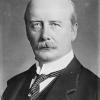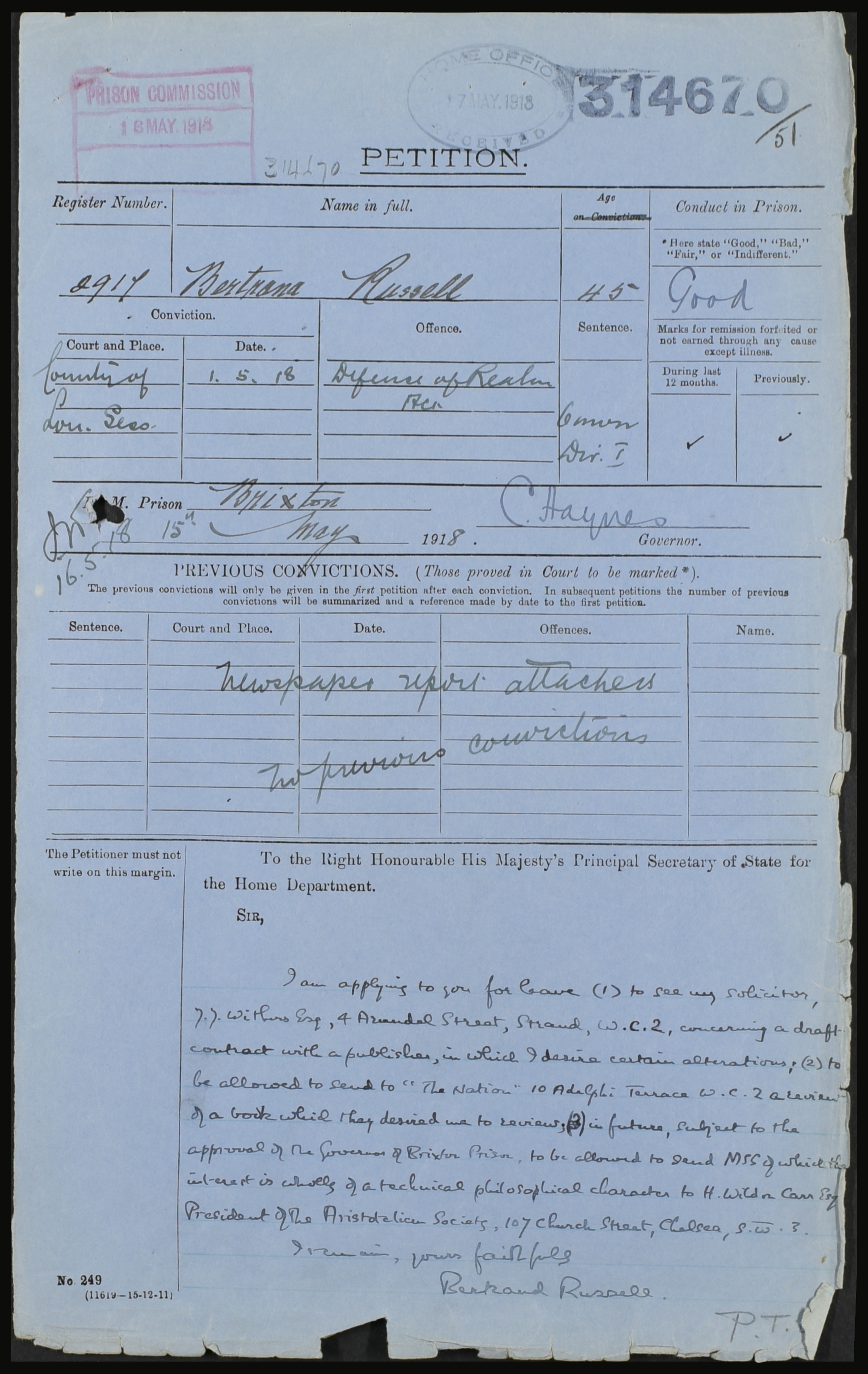
Brixton Letter 4
BR to Home Secretary / Sir George Cave
May 15, 1918
- ALS
- National Archives, UK
- Edited by
Kenneth Blackwell
Andrew G. Bone
Nicholas Griffin
Sheila Turcon
Cite The Collected Letters of Bertrand Russell, https://russell-letters.mcmaster.ca/brixton-letter-4Papers 14: App. XIII.4
BRACERS 57174
<petition form>1
H.M. Prison Brixton
15th May 1918.
To the Right Honourable His Majesty’s Principal Secretary of State for the Home Department.
Sir,
I am applying to you for leave (1) to see my solicitor, J.J. Withers Esq, 4 Arundel Street, Strand, W.C.2, concerning a draft contract2 with a publisher, in which I desire certain alterations; (2) to be allowed to send to The Nation 10 Adelphi Terrace W.C.2 a review of a book3 which they desired me to review; (3) in future, subject to the approval of the Governor of Brixton Prison, to be allowed to send MSS of which the interest is wholly of a technical philosophical character to H. Wildon Carr Esq, President of the Aristotelian Society, 107 Church Street, Chelsea, S.W.3.
I remain, yours faithfully
Bertrand Russell.
- 1
[document] The letter was edited from a digital scan of BR’s signed, handwritten contribution to a petition form printed on a long, single blue sheet located in the National Archives, UK. The addressee’s formal title is printed on the form. The date is written in another hand on the form, misspelling BR’s first name. The governor approved it by signing it (“C. Haynes”), after rating BR’s conduct so far as Good, above a printed mention of early remission: “Marks for remission forfeited or not earned through any cause except illness.” There are two date-stamps: 16 May 1918 by the Prison Commission, and 17 May 1918 by the Home Office. The letter was published as App. XIII.3 in Papers 14.
- 2
contract BR’s only publishing contract then in draft was for Introduction to Mathematical Philosophy. BR saw Withers on 3 June (Letter 12). See note 3 to Letter 21 for clauses BR wished altered in this agreement. Although there was trouble with Lippincott over their contract to publish Roads to Freedom, their letter of 23 May 1918 (BRACERS 48708) declining to do so could hardly have arrived before BR saw Withers.
- 3
book … to review “Pure Reason at Königsberg”, a largely favourable assessment of Norman Kemp Smith, A Commentary to Kant’s “Critique of Pure Reason” (London: Macmillan, 1918), in The Nation 23 (20 July 1918): 426, 428 (B&R C18.05); 14 in Papers 8. BR concluded the review: “It is with a strange heartache that one looks back to the days when the Königsberg philosopher lived a life of pure reason; in our time the life of reason is more difficult and more painful.”
Brixton Prison
Located in southwest London Brixton is the capital’s oldest prison. It opened in 1820 as the Surrey House of Correction for minor offenders of both sexes, but became a women-only convict prison in the 1850s. Brixton was a military prison from 1882 until 1898, after which it served as a “local” prison for male offenders sentenced to two years or less, and as London’s main remand centre for those in custody awaiting trial. The prison could hold up to 800 inmates. Originally under local authority jurisdiction, local prisons were transferred to Home Office control in 1878 in an attempt to establish uniform conditions of confinement. These facilities were distinct from “convict” prisons reserved for more serious or repeat offenders sentenced to longer terms of penal servitude.
Governor of Brixton Prison / Carleton Haynes
Captain Carleton Haynes (1858–1945), the Governor of Brixton Prison in 1918, was a retired army officer and a cousin of BR’s acquaintance, the radical lawyer and author E.S.P. Haynes. In March 1919 BR sent Haynes, in jest, a copy (now in the Russell Archives) of his newly published Introduction to Mathematical Philosophy — so that the governor’s collection of works written by inmates while under his charge would “not ... be incomplete” (BRACERS 123167).
H. Wildon Carr
Herbert Wildon Carr (1857–1931), Professor of Philosophy at King’s College, London, from 1918 and Visiting Professor at the University of Southern California from 1925. Carr came to philosophy late in life after a lucrative career as a stockbroker. His philosophy was an idiosyncratic amalgam of Bergsonian vitalism and Leibnizian monadology, which, he thought, was supported by modern biology and the theory of relativity. He wrote books on Bergson and Leibniz at opposite ends of his philosophical career and a book on relativity in the middle. His philosophy would have made him an unlikely ally of BR’s, but it was Carr who organized BR’s two courses of public lectures, on philosophy of mathematics and the philosophy of logical atomism, which brought BR back to philosophy and improved his finances in 1917–18. Carr had great administrative talents, which he employed also on behalf of the Aristotelian Society during his long association with it. He was its president in 1916–18 and continued to edit its Proceedings until 1929.
J.J. Withers
John James Withers (1863–1939; knighted 1929) was senior partner in the prominent City law firm that bore his name and was located near the legal district of the Temple. Specialists in family law (although clearly not to the exclusion of other services), Withers & Co. acted for both BR and his brother for many years. In 1926 Withers was elected unopposed as Conservative M.P. for Cambridge University and held the seat for the remainder of his life.
The Nation
A political and literary weekly, 1907–21, edited for its entirety by H.W. Massingham before it merged with The Athenaeum and then The New Statesman. BR regularly contributed book reviews, starting in 1907. During his time at Brixton, he published there a book review (14 in Papers 8; mentioned in Letters 4 and 102) and a letter to the editor (Letter 39). In August 1914 The Nation hastily abandoned its longstanding support for British neutrality, rejecting an impassioned defence of this position written by BR on the day that Britain declared war (1 in Papers 13). For the next two years the publication gave its editorial backing (albeit with mounting reservations) to the quest for a decisive Allied victory. At the same time, it consistently upheld civil liberties against the encroachments of the wartime state, and by early 1917 had started calling for a negotiated peace as well. The Nation had recovered its dissenting credentials, but for allegedly “defeatist” coverage of the war was hit with an export embargo imposed in March 1917 by Defence of the Realm Regulation 24B.
Home Secretary / Sir George Cave
Sir George Cave (1856–1928; Viscount Cave, 1918), Conservative politician and lawyer, was promoted to Home Secretary (from the Solicitor-General’s office) on the formation of the Lloyd George Coalition in December 1916. His political and legal career peaked in the 1920s as Lord Chancellor in the Conservative administrations led by Andrew Bonar Law and Stanley Baldwin. At the Home Office Cave proved to be something of a scourge of anti-war dissent, being the chief promoter, for example, of the highly contentious Defence of the Realm Regulation 27C (see Letter 51).
